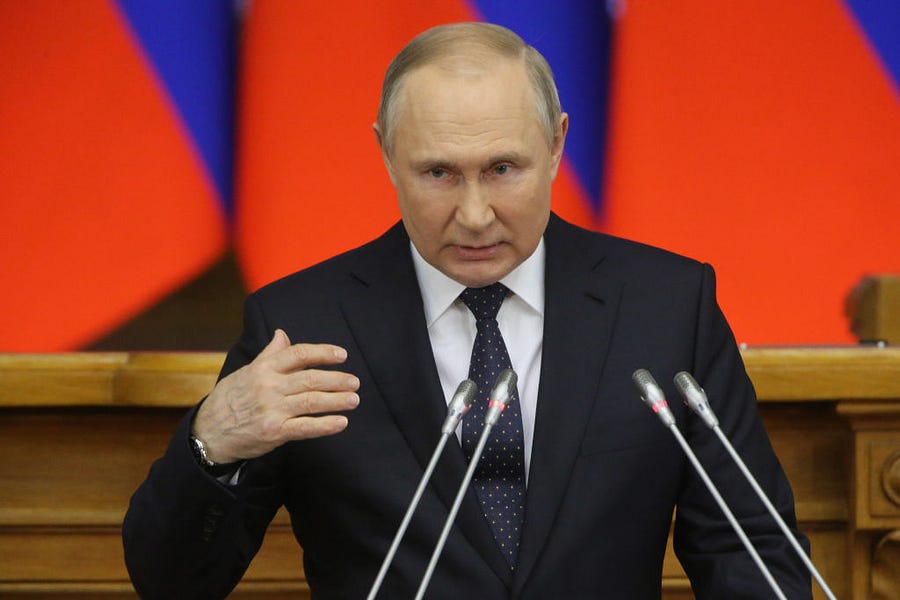Among the most perilous consequences of the war in Ukraine will almost certainly be the increased value placed on nuclear weapons—both by countries bent on wars of conquest and those seeking to deter them. Ukraine’s decision in 1994 to surrender the nuclear arsenal it inherited from the Soviet Union, in exchange for what proved to be empty assurances from Great Britain, Russia, and the United States, appears in retrospect to have been an act of historic folly. As a result, preventing a dangerous proliferation cascade today may require America to extend more binding security guarantees to partner nations than it has heretofore been willing to consider.
Russian President Vladimir Putin’s success in deterring direct Western military intervention by threatening to retaliate with nuclear weapons has been perhaps the war’s starkest takeaway. In response, President Joe Biden has rejected any measures, including a no-fly zone, that might risk combat between U.S. and Russian forces on grounds that it could lead to World War III.
It’s true that Putin’s nukes have not stopped the West from responding in other important ways, including by imposing punishing sanctions and supplying Ukraine with weapons critical to foiling Russia’s initial war plans. But when it comes to deterring direct American intervention—the one step most likely to stem Ukraine’s horrific suffering and inflict the defeat on Russia that U.S. interests require—Putin’s nuclear blackmail has been an unqualified success.
That’s a dangerous lesson for all would-be aggressors. China and Taiwan immediately come to mind. Even before Ukraine, China was rapidly expanding its nuclear capabilities. Putin’s success in deterring America will only confirm for Beijing the enormous utility of brandishing a powerful nuclear arsenal. Putin has proven that the one thing China fears most in Taiwan—having to fight the U.S. military—can be neutralized by wielding the threat of Armageddon.
You can be sure Iran is watching, too. The Islamic Republic’s decades-old quest to develop nuclear weapons is inextricably tied to its goal of dominating the Gulf region—with U.S. military power long being the main impediment. After the wars in Iraq and Afghanistan, Washington is already reluctant to respond forcefully to escalating attacks by Iran and its proxies, even when U.S. troops are directly targeted. Ukraine is proof-positive for Iran’s rulers that crossing the nuclear threshold is their surest path to staying America’s hand permanently.
And what about Taiwan, or Iran’s neighbors (such as Saudi Arabia)? The implications of Ukraine are deeply troubling. They’ve now had a real-world demonstration of the limits of U.S. support when a non-nuclear state with which Washington is friendly, but has no security commitments like NATO’s Article 5, is being brutally laid waste by a rapacious nuclear power. Sanctions, arms supplies, diplomatic condemnations—but nothing more. When it comes to the actual fighting, you’re on your own.
Taiwan had a program to develop nuclear weapons until the 1980s but gave it up under American pressure. Saudi leaders have repeatedly warned that they will acquire nukes if Iran appears on track to do so. With Ukraine as a cautionary tale, you can be sure that discussions about developing their own nuclear options have intensified in both countries—as well as a handful of other states, especially in the Middle East, that see a nuclear Iran as an existential threat.
The risk that the Ukraine war could unleash a wave of proliferation in some of the world’s most strategic and volatile regions should deeply worry the United States. Preventing exactly such a scenario has been a major priority of American foreign policy for six decades—and one of its signal successes.
Historically, Washington’s surest means of persuading vulnerable allies to refrain from pursuing their own nuclear deterrents has been to provide them with explicit guarantees that the U.S. will come to their defense if attacked by a hostile outside power. That almost certainly remains the case today. It’s what Ukraine clearly lacked and what neither Taiwan nor the Saudis feel confident they currently have—especially after more than a decade of successive American presidents looking to do less in the world militarily, not more.
Credibly providing such guarantees would require enormous presidential leadership. The potential downsides are real. They could provoke the Chinese attack on Taiwan that they’re meant to deter. In the Gulf, expanding U.S. military commitments, especially to unpopular partners like the Saudis, could trigger significant political blowback, particularly among Biden’s own Democratic base.
The pros and cons in each case would need to be carefully weighed against the proliferation risks. But in the wake of Ukraine, the dangers of an uncontrolled nuclear cascade are all too real and require urgent attention. The damage that Putin’s war has already wrought is horrible enough. But there are ways that it can still get much worse. An increasingly unstable world with more states having their fingers on the nuclear trigger should surely be near the top of the list.
John Hannah, a senior fellow at the Jewish Institute for National Security of America, served as national security advisor to Vice President Dick Cheney.






Please note that we at The Dispatch hold ourselves, our work, and our commenters to a higher standard than other places on the internet. We welcome comments that foster genuine debate or discussion—including comments critical of us or our work—but responses that include ad hominem attacks on fellow Dispatch members or are intended to stoke fear and anger may be moderated.
With your membership, you only have the ability to comment on The Morning Dispatch articles. Consider upgrading to join the conversation everywhere.